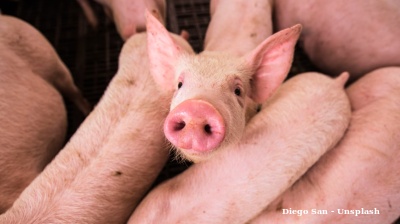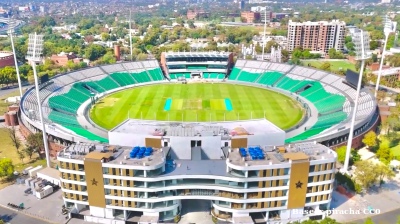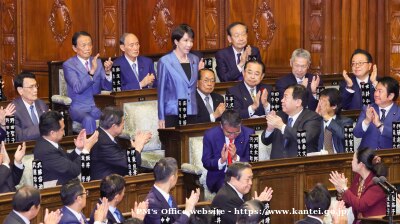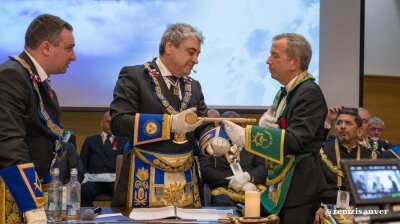The annual St Petersburg Economic Forum (SPIEF) officially opened on June 15, to great pomp and ceremony. St Petersburg Governor Alexander Beglov and head of the breakaway Donetsk People’s Republic Denis Pushilin fired cannons from the Peter and Paul Fortress to mark the occasion.
The "Russian Davos”, the annual conference that is Russia’s premier investment event, normally attracts thousands of businesspeople from across Europe to hobnob with the Russian elite, but this year a mere 115 Western companies chose to take part.
The panels at SPIEF are usually lively as Russian industrialists take the opportunity to showcase their companies and lobby the government for reforms and investment, but this year the event was gutted of any substance as Russia’s war in Ukraine has thrown the future in doubt. It’s hard to make plans when isolation and stagnation looms.
SPIEF is celebrating its 25th birthday this year. It was set up in 1997 as Russia’s answer to the World Economic Forum (WEF) in Davos, with the intention of attracting investment and business to Russia following the collapse of the Soviet Union. In 2004, Vladimir Putin gave the opening speech at the Forum, and it has been traditional for the president to attend ever since.
Historically, political and business leaders from around the world have flocked to the Forum. In past years, guests have included Chinese premier Xi Jinping, French president Emmanuel Macron and UN Secretary-General Antonio Guterres.
This year, Western leaders are steering clear, reluctant to reinforce Russia’s message of economic resilience in the face of sanctions. But a few of the usual attendees from the business world did make the trip, including guests from Canada, Italy, France and the US. But many are worried that attendance may make them a target for future sanctions, and asked the organisers not to print their names on their badges, sources told Bloomberg. Others reportedly plan to leave the conference before the president gives his speech.
Honoured guests
In total, the number of attendees expected this year is less than a quarter of last year’s 13,500, with only 90 countries attending, down from 140 last year.
In the past, western corporate leaders like ExxonMobil’s Rex Tillerson and Goldman Sachs’ Lloyd Blankfein attended, but such names are scarce this year.
“For objective reasons it’s difficult to get to St. Petersburg,” Vedomosti quoted Yuri Ushakov, a foreign policy adviser to President Vladimir Putin, as saying Tuesday, apparently referencing a decision by Western countries to cut air links with Russia.
Ushakov added there would be no delegations from “unfriendly” countries, a Russian government designation that covers 48 mostly Western nations.
The first major session of the current St Petersburg forum, dedicated to the "modern challenges and footholds" of the Russian economy, was not very informative, but emotional.
The panel was made up Russia’s economic and financial heavyweights. Central Bank of Russia (CBR) governor Elvia Nabiullina was the most informative of all, supporting the lifting of restrictions on the movement of capital and the reduction of Russian exports.
The rest of the session participants – presidential advisor Maxim Oreshkin, Russian Finance Minister Anton Siluanov and Minister of Economic Development Maxim Reshetnikov – discussed why “it won’t be like before”, kept cheerful and joked a lot, but didn’t actually mention Ukraine at all during the discussion.
Nabiullina unambiguously called for the lifting of domestic restrictions on the movement of capital within Russia that she imposed in the first days of the war, but she gave no details of which restrictions may go first. As the economy stabilises, the governor has already been easing the capital controls she imposed, but the financial system remains under the tight supervision of the central bank and the exchange rate in particularly remains an artificial construct managed by the regulator. Answering journalists' questions after the session, she said that it was impossible to talk about the abolition of restrictions on the sale of cash currency for the meantime. Although she didn’t say so, the central bank is worried that if it eases controls completely then hundreds of billions of dollars will leave Russia as capital flight, further reducing the CBR’s already limited pool of foreign exchange reserves. Nabiullina stressed that trust needs to be returned to the system.
All participants in the panel agreed that the changes in the economy are not temporary, but profound, and that life will not go back to normal. “It won’t be like before, there are no other options,” Oreshkin, an aide to the president, said categorically. In his opinion, one cannot just wait out this crisis and the sooner everyone understands that, the better.
Minister of Economic Development Reshetnikov spoke about the same. According to him, during the pandemic, there was an understanding that after coronavirus (COVID-19) the economy, although it would be different, would generally be similar to the previous one. Now the depth of change is quite different. Therefore the authorities are faced with the task of "buying the time" that is needed for restructuring to take place within the country.
The “change in the external conditions” will be with Russia for “a long time”, if not forever, added Nabiullina. She noted that the international division of labour in Russia is now hurting: "Our exports are at a discount, imports at a premium." Therefore, according to the head of the Central Bank, we need to think about how to reduce exports – to make sure that a significant part of production works for the domestic market. So far, this idea has not come from the economic authorities in this form.
Disagreements among the participants of the first session arose about macroeconomic forecasts. The host, Andrey Makarov, chairman of the State Duma Committee on Budget and Taxes, pointed out that they are very different. For example, Oreshkin predicted a fall in GDP by 5%, and the head of the Accounts Chamber Alexei Kudrin gave an estimate of 12%.
Oreshkin remains optimistic, although this time he did not back it up with numbers: “The thousand-year history of Russia shows that we always cope, we will cope this time too – we will do it, we will do it well. Yes, it will take time, work, efforts – but we will do it! You just need to believe in yourself: We are a strong country, we are strong people, we can solve problems, we can achieve results."
A friend in need
Despite the low key nature of the event and lack of substance, the event is being closely watched, as those that chose to participate are showing their allegiance to what has become a pariah state. The Kremlin can be counted on to closely count the attendees and reward those that have shown solidarity with sanctioned Russia.
US State Department spokesman Ned Price said last week that the US “will not attend the SPIEF in any capacity” and urged other world leaders and businesses to join a boycott. The move was also publicly supported by Finland. But despite the US ban, the president of the American Chamber of Commerce in Russia, Robert Agee, was listed on Wednesday 15 June among confirmed speakers. In the place of Western political bigwigs, officials from Egypt, Turkey and the Central African Republic will be attending, all of which have strong business ties with Russia.
The investment minister for Myanmar’s military government is also attending the forum, as are the head of Venezuela’s central bank and the UAE’s trade minister.
The only heads of state set to attend the forum are Belarus’ Lukashenko, Kazakh President Kassym-Jomart Tokayev and Armenian President Vahagn Khachaturyan. Chinese premier Xi Jinping and Egyptian President Abdel Fattah el-Sisi will join the plenary panel via video link.
Most notably, the forum is hosting Jamal Nasir Garwalas, a representative of Afghanistan’s Taliban in Moscow. Formally, Russia classifies the Taliban as a terrorist group, but as bne IntelliNews reported, now the Western markets are closed to Russia, the southern route out via Central Asia to the vast Asian markets has gained a new strategic importance last seen a hundred years ago when Russia was a player in the Great Game.
Afghanistan is the key to uncorking Russia’s access to South Asia, but instability and the US occupation has kept that door tightly shut for the last two decades. Following the US abrupt departure last June everything has changed, and both China and Russia are actively engaging with Taliban, hoping to bring peace and commerce to the country.
Kremlin spokesperson Dmitry Peskov said that the Taliban’s presence at SPIEF is not an indication that Russia will formally recognise the Taliban government, but the ban on the group in Russia is blatantly ignored these days.
Instead, the conference’s high turnout from non-western and non-aligned countries should be seen as an illustration of a trend in Russian foreign policy. It is no coincidence that many of the governments providing high-profile guests – Venezuela, Myanmar, Afghanistan – are also subject to Western sanctions and the event has a “meeting of the non-aligned” aspect to it.
With Western companies pulling out of Russia and Western nations weaning themselves off Russian energy, Putin is hoping to pivot away from the West. As part of the effort to create a coalition of economic partners to rival the G7, Putin is wooing non-aligned countries.
"Foreign investors are not only from the United States and European Union," Kremlin spokesman Dmitry Peskov told journalists on Tuesday.
Saudi Arabia’s energy minister, Prince Abdulaziz bin Salman, was also spotted at the forum, where he held talks with Russian Deputy Prime Minister Alexander Novak, according to Reuters.
Putin is not the only leader courting Saudi Arabia, though. US President Joe Biden is also due to go to Riyadh in July, in his first trip to the Middle East since he took up the presidency. Biden is due to discuss a range of topics with Saudi Crown Prince Mohammed Bin Salman (MbS), including “means for expanding regional economic and security co-operation… deterring threats from Iran, advancing human rights, and ensuring global energy and food security,” according to White House Press Secretary Karine Jean-Pierre.
Following the imposition of the sanctions regime on Russia, the world is being to an extent split into two: those that openly support Russia and those that are against it. Putin is already working hard to shore up his relations with Russia’s friends and woo those that are sitting on the fence. The US is anticipated to do the same and the Middle East in particular is expected to gain from this tension as both sides try to bring it into their camps.
The next big event where countries can vote on their preferences will be the G20 meeting in Indonesia this November, where Putin plans to participate in person.
New opportunities
In the midst of this geopolitical tug-of-war, SPIEF appears to be seen by Putin as another opportunity to attract the investment and support of countries in the Global South. The official topic of this year’s forum is “New Opportunities in a New World.”
With Russia under extreme sanctions since it sent troops into Ukraine on February 24, the true nature of that “new world” may not match the upbeat message which the forum hopes to convey. Other than oblique references to “a difficult time” and “mistakes of the West”, the government officials speaking on the first day made no mention of the conflict in Ukraine. Putin avoided mentioning his “special military operation” entirely in his greeting letter to attendees of the conference.
The forum’s programme contains little mention of Ukraine. However, the Kremlin’s war is set to be discussed as part of a session about “Fake news in the era of globalisation,” attended by Foreign Ministry spokeswoman Maria Zakharov, Russian lawmaker Alexander Khinshtein and pro-Kremlin pranksters Vovan and Lexus, among others.
Meanwhile, Vladimir Putin’s traditional question-and-answer session with executives of major international news organisations will not take place when he attends in person on June 17. Instead, he will meet with the heads of Russian news media and “front-line reporters” from Russia’s military operation in Ukraine, according to Kremlin spokesman Dmitry Peskov.
Other sessions will cover topics such as protecting “national media sovereignty” and boosting consumer and business patriotism in import substitution efforts.
Putin’s traditional speech is scheduled to take place at the SPIEF plenary session on June 17 and will be very closely watched. Kremlin spokesman Dmitry Peskov told journalists that this “extremely important” address will focus on “anti-Russian sanctions.” Nearly 1,000 foreign companies have curtailed operations in Russia since the start of the invasion of Ukraine, according to data published by the Yale School of Management.
The impact of the sanctions can also be felt outside the conference room. Foreign visitors were told to bring cash, because Mastercard and Visa bank cards issued outside Russia no longer work there.
For Russia, forging an economic alliance with some of the guests in attendance is more important than ever. As presidential adviser Maxim Oreshkin was keen to stress, Russia should not expect things to revert to how they were before the pandemic – and before the war. “It simply won’t be how it was before. There’s no other way of putting it.”
News

Taiwan confirms first African swine fever outbreak
Authorities detected the virus on a pig farm in Wuqi District, Taichung, after 117 pigs died between October 10 and 20.

Afghanistan withdraws from Pakistan tri-nation T20 to protest murder of three local cricketers
The Afghanistan Cricket Board says it has secured clear video footage implicating the Pakistan state in an attack that killed three local cricketers.

Sanae Takaichi makes history as Japan’s first female prime minister
In her first press briefing as leader, the 64-year-old pledged to drive reform with confidence and determination, describing her administration as one “ready to decide and move forward.”

White House halts plans for Trump-Putin summit in Budapest
Anonymous White House official tells AFP there are “no plans” for Trump to meet Putin “in the immediate future”, effectively shelving a Budapest gathering that Trump had described as imminent only days earlier.



